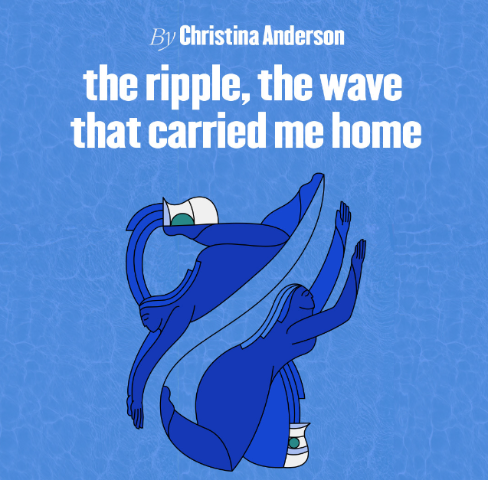Season Closer at Yale Rep Disappoints
the ripple, the wave that carried me home by Christina Anderson
By: Karen Isaacs - May 18, 2023
Why? I kept asking myself that as I was watching the Yale Rep production of the ripple, the wave that carried me home which runs through Saturday, May 20.
Primarily I was wondering why playwright Christina Anderson structured this work the way she did. Even though this work was just 90 minutes, it seemed longer.
Three voicemail messages open the play. It hardly catches our interest as a character called “Young Chipper Ambitious Black Woman” tries to connect with Janice. The reason? The community pool in Beacon, Kansas will be named in honor of her father and the committee wants her there.
We then meet Janice, a successful career woman living in Ohio with her unseen husband and children. It’s 1992 and the Rodney King police brutality trial is going on in Los Angeles.
Janice spends most of the evening telling us the story, interspersed with some scenes.
A narrator telling us things that could have been dramatized is usually a problem. Here it is.
What Janice tells us can be very interesting. She talks about growing up in Beacon, Kansas, and the three community swimming pools available. This being 1956, Beacon is still segregated. One pool is beautiful with all the amenities and well maintained. It is open to whites only. The second is nice, but also open only to whites, while the third pool is dilapidated. It was the only pool blacks were allowed to use.
She fills us in on much history, not only of growing up in 1956 but of her father when he was a teenager. Only occasionally do the lights come up on the people she is speaking about, and we have a brief scene.
The gist is that both her mother and father were swimmers and dedicated their spare time to helping members of the black community learn to swim. Her father’s father had started a swimming program that was successful.
She also tells us that all the pools shut down rather than integrate them; when a judge ordered them reopened but with an admissions charge, whites surrounded two of the pools. They were all closed again.
Will Janice go to the ceremony recognizing her father? That’s the main conflict which isn’t much to build a play around. She has avoided Beacon though her aunt and her mother still live there.
Anderson tries to use water as a metaphor. Janice says “My family, my ancestry, is a tree of small rivers. Roots filled with lakes of memory. So while I grew up in a landlocked environment, the family was an ocean.” She equates water to other things as well, but this doesn’t add to the substance of the play.
An undercurrent of the play, which could be better developed, is the fact that the pool is being named for her father while ignoring that her mother was just as active and made just as much a contribution. The irony that “Young Chipper Ambitious Black Woman” is in charge and probably made the decision is never explored.
The ending seems to be an oblique hint of reconciliation.
Yes, there are some funny moments and some touching ones, but overall, it is hard to become engaged with the characters. Except for Janice, they appear only in short scenes that allow for little depth of character.
Each of the performers does the best they can with the material. Jennean Farmer must tell us the story as Janice. That she makes it as interesting as she does and sound as conversational is a reflection of her skills as an actor. The others – Chalia La Tour as her mother, Adrienne S. Wells as her aunt, and Marcus Henderson as her father make these underdeveloped characters come to life. Wells also plays “Young Chipper Ambitious Black Woman.”
The scenic design by Emmie Finckel mimics a swimming pool and sound designer Evdoxia Ragkou sometimes gives us the echoes of sound bouncing off the tile.
If this play has received awards, is there a problem with Tamilla Woodward’s direction or vision? Perhaps though the direction seemed fluid.
For tickets visit YaleRep.org.
This content is courtesy Shore Publications and ziip06.com

